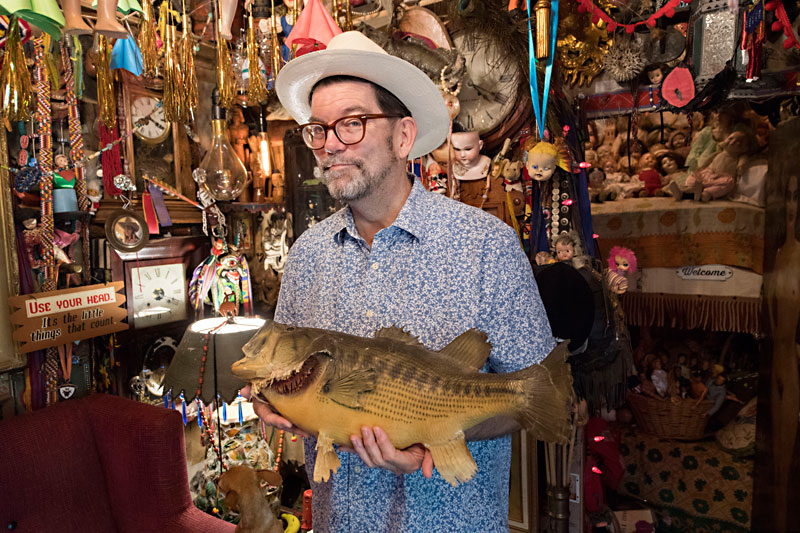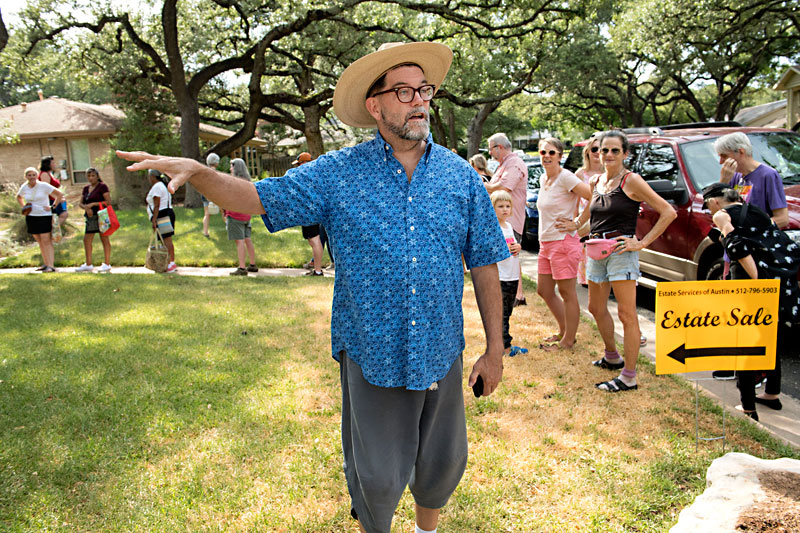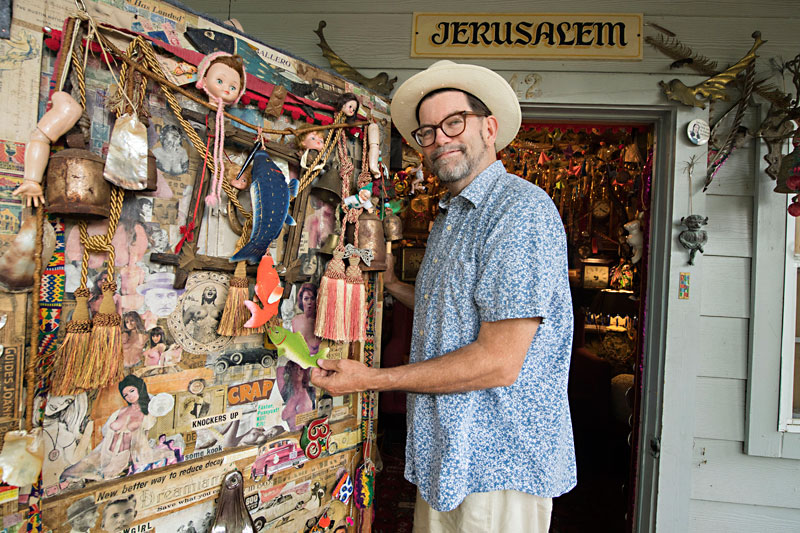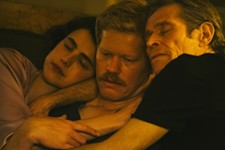How Estate Services of Austin Finds New Homes for Treasures Left Behind
In the saddest times, Carl McQueary and the Estate Services team are there to help
By Richard Whittaker, Fri., July 22, 2022

– René Belloq, Raiders of the Lost Ark
If you're driving in the residential streets of Austin's older neighborhoods and you see a trail of little yellow arrows pointing to an estate sale, if you follow their directions you may find Carl McQueary at the end. Most weekends, the owner and founder of Estate Services of Austin is working the register at a house clearance, smiling beatifically under his signature wide-brimmed hat.
It's not always a death but, he said, "estate sales are never based on a happy story." Sometimes it's a divorce, or downsizing, or a move. "It's all end of life or end of phase of life," McQueary said, but whatever the situation he knows that the process of emptying their home must be done with dignity, compassion, and respect. "We're the funeral directors of stuff," he said.
At the same time, the sale itself has to be fun. Before any house clearance starts, he'll head outside to talk to the people at the head of the line. And a line there will be. McQueary has a following: quite literally. He has his mailing list, and he has his Instagram account where, a few days before a sale, he'll often stream one of his Coffee Talks With Carl, a combination of sales pitch and porch philosophizing. And his regulars will come, in boiling heat and streaming rain, lining up for hours to be first there, to get that period barrister bookcase he mentioned, or procure quality cutlery at a discount price, or maybe just browse through bookshelves in hope of finding a good read. "When you've been in this business as long as I have, you know the first 50 people in line," he observed. Many are smiling, but some turn up mad, and that baffles McQueary. "This isn't combat. I'm not in your way. I'm not trying to slow you down from getting your precious. I'm augmenting you and helping you acquire that which you want."
Sometimes it's the client that's difficult, but often that's because he's coming into their lives at their lowest ebb. He's found himself in the middle of warring divorcees ("Two people who were once in love, who know everything about each other, are now splitting the sheets, as my father would say"), helping hoarders with deep psychological issues ("Hoarding is having a demon inside of you that says, 'Save this'"), and, worst of all, suicide. "We try to send those things back into the world with special care," he said, but whatever the story, everyone gets the compassion they need. "Many's the time I've held a client."
But in most estate sales there's also one person who can't speak for themselves. The decedent, the dead, the person whose property everyone is picking over – at least, the property that McQueary puts out. Part of his job is the delicate task of removing all traces of the secrets people kept: the peccadillos, kinks, addictions, the sad and lonely intimacies. "We see about everything that you could ever see," he said, and it's not just about protecting their posthumous reputation, or hiding Gram-Gram's meth habit from the grandkids. "Sometimes it's a feeling or an energy, maybe just dust that smells like them, whatever, but they're still there, and you have to bear that in mind."
As he sits behind the sales table, there's a specific warm smile that spreads when someone brings up an item that means something to them: the sketches from an artist's notebook or the okobo, the lacquered shoes of a geisha gifted to a diplomat. He's not simply selling old stuff. "I'm sending things to their next assignment."
You might think that McQueary's own home would be a storage facility of the strange and fascinating, piled with ephemera and random artifacts gathered from years of seeing the best and the finest of what homes and lives have to offer. Instead, it's a refined and curated space, the walls adorned with original art, bought directly from local artists, most of them UT-Austin faculty. Buying from his own sales is a no-no – too complicated, too tempting. If he's given space to a little chaos in his life, it's not in the house but in Jerusalem. That's what he calls the shed behind his home, where he records those Coffee Talks With Carl broadcasts. From outside it looks like it's just tool storage, but inside it's a combination study, sanctuary, cabinet of curiosities, and collage.
"People think it's come from my estate world," he said, "but it has not. This crap is too weird for the estate world." Yet it too is clearly guided by a precise eye, the books in order, the impishly selected ornaments displayed rather than just shelved. No surprise considering that, aside from the house clearance business, McQueary has been a museum director, author of multiple books on Texas history, and an acknowledged expert on Texas modernism – even serving on the Texas Historical Commission. In Jerusalem, a couch is a resting place for the shifting number of dogs that tick-tick-tick across the floor before jumping into McQueary's lap and falling, almost instantly, asleep, as he recounts his history in the estate sale business.
How he got into it was sheer accident. For his first job, he was working in the Museum of the Plains in Perryton, Texas: walking distance from the Oklahoma Panhandle, surrounded by "60 miles of nothing," McQueary said.
Back up. How did the urbane, soft-spoken art historian end up in Perryton, pop. 8,802? In 1985 he was 21 and studying museum science at West Texas State University when a friend, Jimmy Reid, invited him to his grandfather's farm for a vintage heavy engineering show. "His grandfather said, 'You should come run our museum,' and I'm like, 'OK.' We visit over supper a little bit, and the next thing you know I'm visiting with the board, next thing I'm the damn director." He put a four-year stop on his college career to run this little county museum with its collection of steam-powered farm equipment and a 1930s kit airplane – although, as he noted, he did finally graduate with an M.A. in museum science from Baylor.
That's where he learned the estate sale business. Well-to-do widows, inheritors of wheat and oil money, would bequeath their estates to the museum ("It was the thing to do," McQueary observed), and it would be his job to "harvest the six things we wanted." That left him with what he called "a house full of a life to get rid of," and so it became his job to sell everything else off. A local auctioneer taught him the ropes, "and then eventually it was a little sideline that I did for 20 years." He kept it up through his years as a writer and historian, even after he moved to Austin and became the archivist and historian for Seton Healthcare Family. He became so successful that it basically became two full-time jobs until finally, five years ago, the sideline became his day job. "And that's how I got into it."
Back when he started, he was clearing the museum's shelves of inherited bric-a-brac. These days, what he's really doing is clearing houses for sale ("the real prize in this market"), and the couple of days of the estate sale are just one part of the process. What McQueary does is a lot more than just slapping stickers on a few old glasses and haggling over whether the rings on a $10 coffee table mean it's an $8 coffee table. At any one point in time there are 30 to 40 estate sales companies in Austin – some fly-by-night first-timers, others veterans with whom McQueary is professionally courteous to downright friendly, "but even then you don't talk about price guides, you don't talk about the details of your business, you don't give away trade secrets." He laughed. "That's so damn dumb. If someone rings me up and goes, 'Carl, hey, blah blah blah,' I'll go, 'Sure, be-di-ba-di, ba-di-ba-do.' Because a rising tide lifts all ships, so why the hell would you not share secrets that make the business better?"
But in many ways, McQueary isn't really in competition with them. First off, he's not simply a house clearer for hire. His clients are all recommended to him – by lawyers, funeral directors, estate agents who know him (he doesn't advertise, and once had a website for one day but took it down because it was too much stress). His specialty is in the million-dollar homes, which, he noted, used to mean movie stars and now it's regular people who've seen the value of their home skyrocket. But property valuation isn't everything when it comes to accepting clients. It has to be the right people, the right property, the right possessions for McQueary. It's the unusual houses, the artists' homes, the places with curios that need some appreciation. These homes are often little time capsules, with decades of aggregated possessions.
His placid, gentle tone may seem ill-suited for the frenzy that each sale brings with it. Last year, McQueary oversaw 41 estate liquidations, and he expects that number to rise this year. Some are booked months in advance, some a few weeks, but all work to the same simple timeline. "You have two days, sometimes three, to liquidate a life's possessions," he said. "From a set of spoons to a samurai sword to used underwear – everything."
But before the sale begins, there's a process. Once the contract is signed, "everyone takes a breath," McQueary said. Then begins the weeklong process of getting the house ready. "The first day, that's usually just me. I go and I sit with the house, and I appreciate what's there. … The second day, that's when it starts." This can be a strange moment, when it stops being someone's home. "The spell is broken," McQueary said, and the house becomes a salesroom. Often that means cleaning, emptying the fridge and the trash can, setting up tables, working out where to position the checkout and the hold tables. "We're a machine, getting things ready," he said. In the early days, he'd try to make everything look as beautiful as possible, "and then we learned, people don't give a crap if it's in a beautiful arrangement … So we get everything shoppable [and] in five days or less, we can have your house staged and ready to go."
Then there's the fine art of pricing. The aim is always to maximize the revenue, but at the same time everything must go. High-ticket items are gone before the sale starts, evaluated by the coterie of experts McQueary has assembled over the years, and that expertise shifts. Most houses have a 50-year cycle, which is about the duration of an adult's life from when they start acquiring household possessions to death or retirement: So when McQueary started he saw a lot of midcentury modern designs, and now it's all Seventies and Eighties. If the team finds a particularly valuable item, it goes to auction: Sometimes he'll go to Sotheby's or Bonhams, but mostly with the father-and-son team of Ross and Chris Featherstone at Austin Auction Gallery, with whom he has worked for over two decades. Those deep and abiding relationships are as important to McQueary as the money he makes, maybe more so, and he constantly praises his sales team, who works the register, shifts boxes, keeps an eye on sticky-fingered customers and tag poppers, and makes all this possible. "Estate sales aren't about stuff, they're about people," McQueary said, and that includes the customers. "You have the rich-richies – maybe six or seven of those – and then you have the neighbors who just want to see the house, and then you have the shoppers, who run from people who own seven antique shops to people who hoard things in the basement. So learning how to deal with them, and recognize them for who they are, that's the main thing." It's a people business, and he learned that early on in Perryton, where everyone knew everyone else and everyone had a story. "'Well, I gave Mrs. Blah Blah this thing.' Well sorry, you still don't get a discount." Under the kind demeanor, there's a reserved steeliness. "You have client responsibility and your commission depends on it, frankly, and if they're pushing too much I go, 'Sorry it's no longer for sale,' and put it behind the counter. Then it goes to the next person."
Some of those lessons have been learned the hard way. A few years ago, a woman turned up, begging to be let in. "'I know I'm early.' Well, you're two days early, darlin'. 'But Momma is sick and I saw this thing in the picture, and I really want to acquire it for her,' and she just went on and on and on, and me being me I went, 'OK, darlin', come on in,' and she came on in and she shopped for a while and bought a big pile of crap, and then took it away with her, supposedly for her mom. A few days later, I go to the City-Wide Garage Sale, and there she is, selling the crap that I sold to her."
And the job isn't over when the sale is done. His job is to clear the whole house, and once the last buyer has gone there's usually a huge amount of useful, usable stuff left behind. Sometimes he'll hold a free day, so that people who couldn't afford items can still get something. That's when the charities and the refugee resettlement groups arrive. One volunteer who collects for the homeless "told a story that broke my heart," McQueary said. One day, he'd opened the doors to his van, and one woman pushed through the crowd and asked for a blanket. "He said, 'Sure, right here,' and she goes, 'This is my only possession.' You don't think about that kind of thing, but it's everywhere, every day."
Then come the trash haulers, who clear away all the truly unsellable detritus, and even then they'll try to divert as much as possible away from the landfill, like the old filing cabinets that never sell but can still be valuable as scrap, or unused building supplies that can go to Habitat for Humanity. It's a point of pride to McQueary that he runs one of the greenest estate sales companies in town, but it's the pride in doing the right thing. "Everything goes where it's supposed to go," McQueary said. "It goes to the person it's supposed to go to."
For information on Estate Services of Austin sales, follow them on Facebook or Instagram.











